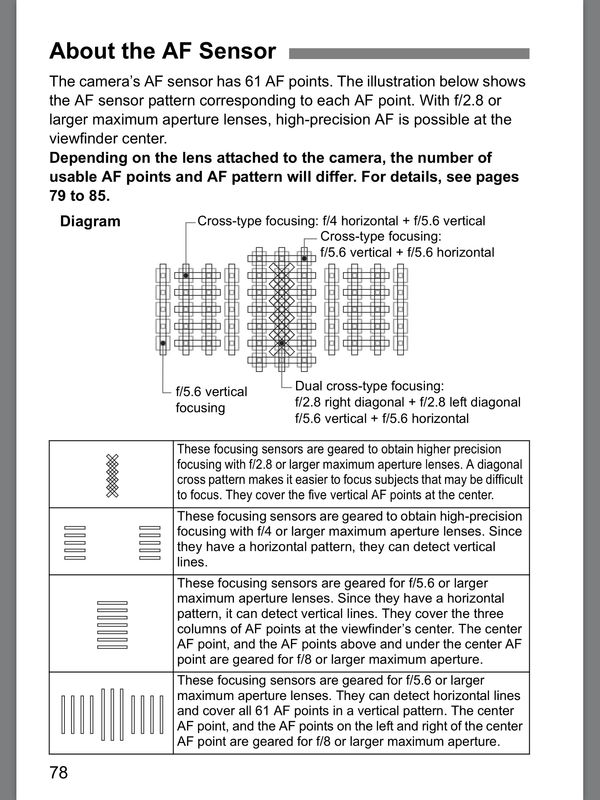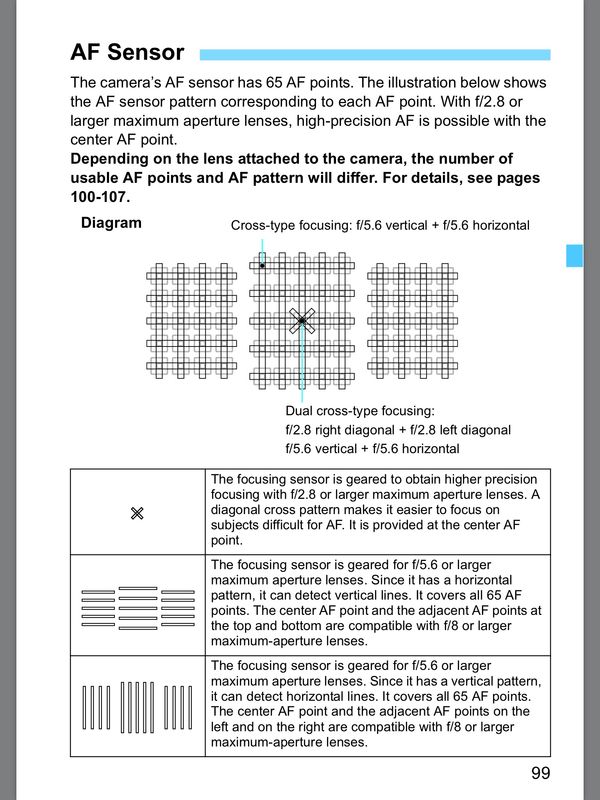Canon Lens- Why Choose The F/2.8 Over The F/4 Versions
Apr 8, 2015 09:12:47 #
I am speaking from the perspective of using Canon lens on Canon bodies- the 5D MK III and 7D MK II in particular.
The F/4 versions of the lens are cheaper and weigh less, two good advantages. The current Canon bodies are pretty good with a high ISO than earlier models so is a one stop difference is not that important? Yes and no. Under fair to good lighting conditions you could get by with raising the ISO to compensate for the 1 stop difference.
So why pay the difference?
1) Shallower depth of field.
2) Will focus better in low light situations.
3) Using a lower ISO setting.
4) Having AF while using a 2x teleconverter (I know that a few of the newer Canon bodies can use the center AF point to AF at F/8.
And here is something I don't see discussed very much:
Here are pages from the camera manuals for the 7D MK II and the 5D MK III. The lens make a considerable difference as to how the AF works. Canon divides their lens into different groups based on how they perform with the cameras AF. A quick glance through the manual will show you that if you want the best AF performance from your camera, you need a lens that will allow you to do that. This is not important if you are primarily shooting static subjects but when it comes to action photography and low light photography- it can mean a great deal.
What do you think?
The F/4 versions of the lens are cheaper and weigh less, two good advantages. The current Canon bodies are pretty good with a high ISO than earlier models so is a one stop difference is not that important? Yes and no. Under fair to good lighting conditions you could get by with raising the ISO to compensate for the 1 stop difference.
So why pay the difference?
1) Shallower depth of field.
2) Will focus better in low light situations.
3) Using a lower ISO setting.
4) Having AF while using a 2x teleconverter (I know that a few of the newer Canon bodies can use the center AF point to AF at F/8.
And here is something I don't see discussed very much:
Here are pages from the camera manuals for the 7D MK II and the 5D MK III. The lens make a considerable difference as to how the AF works. Canon divides their lens into different groups based on how they perform with the cameras AF. A quick glance through the manual will show you that if you want the best AF performance from your camera, you need a lens that will allow you to do that. This is not important if you are primarily shooting static subjects but when it comes to action photography and low light photography- it can mean a great deal.
What do you think?
Apr 8, 2015 09:34:40 #
I cannot discuss AF with Canon cameras because I am a Nikon user.
Modern AF systems are excellent to the point that the majority of them can AF in dim light with kit lenses, not necessarily fast lenses. A lens with an aperture of f2.8 is only 1 stop faster than a lens with an f4 aperture. Unless it is strictly necessary to use the f2.8 lens the lens with the f4 aperture will do very well, even for depth of field if the operator knows what he or she is doing and I am talking about maximum lens opening because at f11 it makes no difference.
This is the first time I read that a lens with f2.8 aperture can AF better than a f4 lens.
Modern sensors are so good that their low light performance is exceptional. For very low light performance the ISO speed can be kept low while the camera is on a tripod.
There is a significant saving when comparing the prices of a lens with f2.8 against another with f4 apertures at their maximum settings.
With my Nikon bodies I never had an issue focusing even if the lens was closed to f16 with lenses with a maximum opening of f5.6.
If the AF system of one camera works differently to the other one that I do not know.
Modern AF systems are excellent to the point that the majority of them can AF in dim light with kit lenses, not necessarily fast lenses. A lens with an aperture of f2.8 is only 1 stop faster than a lens with an f4 aperture. Unless it is strictly necessary to use the f2.8 lens the lens with the f4 aperture will do very well, even for depth of field if the operator knows what he or she is doing and I am talking about maximum lens opening because at f11 it makes no difference.
This is the first time I read that a lens with f2.8 aperture can AF better than a f4 lens.
Modern sensors are so good that their low light performance is exceptional. For very low light performance the ISO speed can be kept low while the camera is on a tripod.
There is a significant saving when comparing the prices of a lens with f2.8 against another with f4 apertures at their maximum settings.
With my Nikon bodies I never had an issue focusing even if the lens was closed to f16 with lenses with a maximum opening of f5.6.
If the AF system of one camera works differently to the other one that I do not know.
Apr 8, 2015 09:48:53 #
If you are shooting low light, choose the faster zoom. Or choose slower zooms and use fast primes for low light.
If you want to use teleconverters, choose the faster zoom. TCs on slow zooms will push the aperture above the minimum aperture for auto focus.
If you want to use teleconverters, choose the faster zoom. TCs on slow zooms will push the aperture above the minimum aperture for auto focus.
Apr 8, 2015 10:07:44 #
[quote=haroldross]I am speaking from the perspective of using Canon lens on Canon bodies- the 5D MK III and 7D MK II in particular.
As a Canon user I also have had this as a thought. I guess that the major factor for many of us who do not have the cameras as a tool for a living must ask can we afford the very best and will our spouse allow it.
If the 2.8 lens is in the budget then it is worth the expense. If not then I always try to get the very best that I can afford and accept that I will be limited and work within that limitation.
If I could afford a P51D I would get it instead of an older used Archer.
So look at what you are shooting, get the best that works for you then work real hard at making great photos in composition and other atributes that make a great photo.
As a Canon user I also have had this as a thought. I guess that the major factor for many of us who do not have the cameras as a tool for a living must ask can we afford the very best and will our spouse allow it.
If the 2.8 lens is in the budget then it is worth the expense. If not then I always try to get the very best that I can afford and accept that I will be limited and work within that limitation.
If I could afford a P51D I would get it instead of an older used Archer.
So look at what you are shooting, get the best that works for you then work real hard at making great photos in composition and other atributes that make a great photo.
Apr 8, 2015 10:12:37 #
[quote=Architect1776]
Precisely.
haroldross wrote:
I am speaking from the perspective of using Canon ... (show quote)
Precisely.
Apr 8, 2015 10:55:20 #
All this talk about f2.8 as fast is just non sense. When I use to shoot film f1.4 or f1.2 was a fast low light lense. But like what was said above the improvement of better sensors and higher ISO capability with the newer cameras being made one can do quite well at producing quality photographs with lenses at f3.5 and f4. My 2cents?
Apr 8, 2015 11:08:33 #
TheDman
Loc: USA
Another reason: often, especially at telephoto lengths, the 2.8 lenses give you better optics and therefore much better image quality.
Apr 8, 2015 11:33:27 #
haroldross wrote:
I am speaking from the perspective of using Canon ... (show quote)
Great post! A question, please. Why does the lens' speed effect ISO? You imply that faster lenses allow the use of lower ISO settings. Interesting observation, but I am not sure I follow your logic. Can you explain? Thanx.
Apr 8, 2015 11:38:44 #
davidrb wrote:
Great post! A question, please. Why does the lens' speed effect ISO? You imply that faster lenses allow the use of lower ISO settings. Interesting observation, but I am not sure I follow your logic. Can you explain? Thanx.
If I have an f/4 and an f/2.8 lens. Using the exposure triangle, I can use a lower ISO with f/2.8 than with f/4 when using the same shutter speed such as 1/500th.
Apr 9, 2015 06:38:42 #
haroldross wrote:
br br br So why pay the difference? br br 1)... (show quote)
I think you have already answered your question. Faster is always better since the AF system focuses @ wide open (ie:f2.8 or f4.0) That's why the third party super zooms struggle with AF @ f6.3.
I believe f4.0 lenses are a middle ground for someone who wants a better lens than a "kit" lens but can't justify the cost of an f2.8 "pro" lens.
Apr 9, 2015 06:49:50 #
naturepics43 wrote:
I think you have already answered your question. Faster is always better since the AF system focuses @ wide open (ie:f2.8 or f4.0) That's why the third party super zooms struggle with AF @ f6.3.
I believe f4.0 lenses are a middle ground for someone who wants a better lens than a "kit" lens but can't justify the cost of an f2.8 "pro" lens.
I believe f4.0 lenses are a middle ground for someone who wants a better lens than a "kit" lens but can't justify the cost of an f2.8 "pro" lens.
Exactly. 2.8 helps if you are using a teleconverter too.
Apr 9, 2015 08:59:36 #
I have used Canon cameras since 1968. I use the fastest canon lens i can simply for the shallow depth of field. I shoot full frame for the same reason. My favorite lens is a 135 f2.0. I think it is the best portrait lens on the market. I only wish I could afford the 85 1.2. With the ability to shoot at relatively high ISO with little loss of image quality I think there is no reason to use the faster lens for low light situation.
Apr 9, 2015 09:31:11 #
What I'm finding is, as I purchase newer equipment it becomes less necessary to buy fast lenses and to carry around tri-pods . My New Canon full frame kind of does it all for me.
Apr 9, 2015 09:35:22 #
bweber wrote:
.... With the ability to shoot at relatively high ISO with little loss of image quality I think there is no reason to use the faster lens for low light situation.
For most people this is probably okay. I hear this argument all the time but I disagree.
Raising the ISO reduces the dynamic range, contrast, and color vibrancy. Much of this can be corrected in post processing with a sacrifice to sharpness and/or noise among other things. Yes, the cameras of today can utilize some outrageously high ISOs but I prefer to use the lowest possible ISO to get the photo I want. The art of photography consists compromises to get the desired photo.
Apr 9, 2015 09:37:40 #
I agree with everything you wrote. When I wrote "relatively high ISO I meant nothing over 1200. I also use the lowest ISO I can, and I would have to be desperate to record an image if I shot over 1200.
If you want to reply, then register here. Registration is free and your account is created instantly, so you can post right away.










